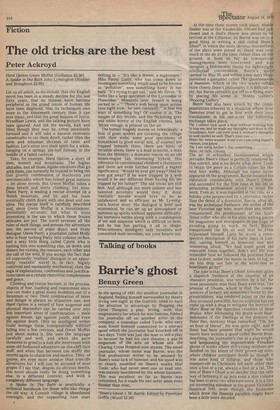The old tricks are the best
Peter Ackroyd
Hard Option Gwen Moffat (Gollancz £3.50) A Spider in the Bath John Lymington (Hodder and Stoughton £2.95)
1.-et us all admit, as we shOuld, that the-English novel has been in a steady decline for the last forty years, that its themes have become peripheral as the grand issues of human life have been displaced, that its techniques owe more to the nineteenth century than it can ever repay, and that the great lessons of Joyce, Wyndham Lewis, and the talking picture have been ignored. And yet the novels, halt and blind though they may be, creep inexorably forward and it will take a natural economic catastrophe to cut them down, rather than the eerie and inhuman dictates of taste and fashion. Let's enter into their spirit for a while, banging on a springy pin-ball fantasy in the middle of a faded carnival.
Take, for example, Hard Option, a story of men, women and mountains. The higher altitudes, and all those Alpine emotions that go with them, can normally be trusted to bring out that ghastly combination of machismo and sentimentality which has ruined great nations — let alone novels. But Gwen Moffat takes a deep breath and starts climbing; her hero, Owen Parry, is leading a rescue attempt on a Welsh mountain, and he and his team eventually climb down with one dead and one alive. The _rescue itself is carefully described and, since Gwen Moffat is a mountaineer, presumably accurate; but what is --rnore" interesting is the use to which these frozen attitudes are put. The novel reverses all the rules of such things, and presses the adventure into the service of some direct and lively dialogue. Owen Parry, a journalist called Molly who is busy turning Parry into column inches, and a sexy little thing called Catrin who is turning him into something else, sit down and dissect the victims, the rescuers, each other and the call of the wild. If you accept the fact that all supposedly 'realistic' dialogue in an apparently 'realistic' novel is, in fact, highly contrived and necessarily mechanical, then the saga of explanations, confessions and justifications takes on a certain rhetorical completeness and grace.
Climbing and rescue become, in the process, objects of fear, loathing and resentment since you can make a great many molehills out of a mountain or two. Their combination of mass and dahger is always an attractive one, and Hard Option is a record of how suspense and physical discomfort can be carried over into less important areas of confrontation — male against female, age against youth, and even life against death. Only an intelligent writer -araild manage these transpositionsWithout' falling into a few crevices, and Gwen Moffat just about makes it. She uses the language carefully and well, and when the pace threatens to grind to a halt she intervenes with some old-fashioned adventure-on-the-cliff-face stuff, and when that becomes too stuffy she reverts again to character and motive. They, of course, are even more antique than true-life a.'clventlires -but I will just be accused of sour, grapes if I say that, despite its obvious merits, this novel should really be doing something else, in a different context, and with a completely different language.
A Spider In The Bath is practically a technical handbook for those who like things the old way. A Cornish village is abandoned overnight, and the supporting cast start drifting in — "It's like a dream, a nightmare." Miss Penny Lusty, who has come down to investigate something which used to be known as "pollution", sees something nasty in her bath: "It's trying to get out," said Mr Silver, "It looks like a large specimen of the Lycosidae or Pisauridae." Moments later, breath is being sucked in — "'There's web being spun across here right now,' he said curiously.' Is this the start of something big? Of course it is. The images of day recede, and the flickering grey and white horror of the English cinema, late 'fifties vintage, is printed on the air.
The human tragedy moves on relentlessly: i host of giant spiders are covering the village with their webs, some poor specimens of humankind (a good social mix, of course) are trapped beneath them, there are hints of invisible aliens, there is a Mad scientist, a man from the Ministry, a dramatic rescue on an old steam-engine (an interesting hybrid, this reference to conventional children's literature) and there are even lurches toward a higher significance: "Would he ever get away? Had he ever got away? If he were trapped in a web -Would it be any different from having his life trapped by his father?" The old tricks are still best. And, although our more solemn and less talented novelists would deny it, Most 'realistic' novels would love to be as unlaboured and as efficient as Mr Lymington's horror story. His dialogue is brief and economical, he can set up an atmosphere or summon up spirits without apparent difficulty, his narrative rattles along with a combination of wit and suspense which is difficult to beat, and he has fun putting it all in shape. Prize-winners, intelligent lady novelists and committed male novelists, eat your hearts out.


































 Previous page
Previous page